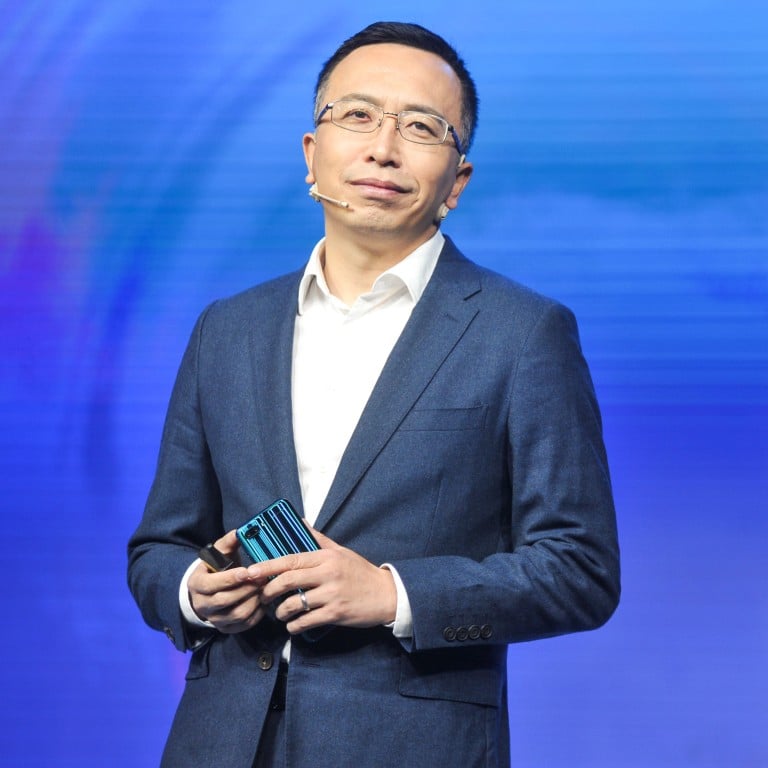Advertisement
Advertisement

Huawei smartphone spin-off Honor has no plans to develop own advanced chips, CEO says, as Qualcomm and MediaTek offer ‘best solutions’
- Honor chief executive George Zhao Ming said the company has no plans to develop its own system-on-a-chip products
- The company will focus on noncore chips such as the C1, a self-developed radio frequency communication device to boost 5G signals
Che Panin Beijing
Honor, the smartphone brand spun off from Huawei Technologies, has no intention to develop its own system-on-a-chip (SoC) products, as it aims to continue using core semiconductors supplied by Taiwan’s MediaTek and US tech firm Qualcomm, according to George Zhao Ming, the Shenzhen-based company’s chief executive.
Zhao said Honor’s focus will be on noncore chips such as the C1, the firm’s self-developed radio frequency communication device that was designed to strengthen 5G signals. Unveiled in March, the C1 chip was initially built into Honor’s Magic5-series smartphones, according to Chinese media reports.
“We don’t have a plan to do SoC development,” Zhao said on Tuesday after Honor launched on the mainland its unique foldable-smartphone-and-handbag product the V Purse, just days after Apple started pre-orders for its new iPhone 15 series. Prices for Honor’s new V Purse start at 5,999 yuan (US$822).
“Honor’s cooperation with MediaTek and Qualcomm has made it possible for us to access the best chip solutions,” he said.
The long-time partnerships with those two suppliers allow chip platform-based optimisation for Honor’s handsets, according to a statement on Thursday from the Chinese company.

Zhao’s comments stand in stark contrast to the patriotic fervour inspired by Honor’s former parent Huawei after it launched new 5G smartphones – the Mate 60 Pro and Mate 60 Pro+ – powered by an advanced processor, which are all made-in-China products that have become symbolic of the country’s defiance of crippling US tech sanctions.
Eric Xu Zhijun, deputy chairman at US-blacklisted Huawei, recently urged China to adopt more home-developed semiconductors even though these lag behind chips produced with foreign technology. He asserted that increased support would eventually help close the gap between China-made and foreign-developed chips.
Huawei believes China’s semiconductor manufacturing technology will continue to be in catch-up mode for a long time because of US export controls, according to Xu.
Honor, meanwhile, in May set up a new subsidiary, Shanghai Honor Intelligent Technology Development Co, that operates inside the city’s coastal Lingang Free Trade Zone with a registered capital of 100 million yuan, according to business data provider Qichacha.
Huawei spin-off Honor steps up chip design effort with new unit
Huawei spin-off Honor steps up chip design effort with new unit
Earlier this month, Honor expanded the capital base of that research-and-development subsidiary to 940 million yuan, which fuelled speculation that the company would be doubling down on in-house chip design activities.
Honor on Thursday clarified that the Shanghai entity serves as one of the firm’s five research-and-development centres in China. It is primarily focused on software, graphics algorithms, and communications and imaging research, according to the company.
Zhao on Tuesday also shut down speculation that Honor, which was sold by Huawei to a consortium of agents and dealers in November 2020, could return to the telecommunications equipment giant’s fold. He said Huawei is treated as another competitor in the smartphone industry.
In the second quarter, Huawei returned as one of the top-ranked vendors in mainland China’s smartphone market, the industry’s biggest. Oppo, Vivo, Honor and Apple remained ahead of Huawei in the quarter, according to data from IDC.
Globally, Honor shipments have grown across markets in Europe, the Middle East and Latin America, according to Counterpoint Research. But Honor still did not crack the top-five smartphone vendor rankings in the second quarter, which was dominated by Samsung Electronics, Apple, Xiaomi, Oppo and Vivo, Counterpoint data showed.

8
